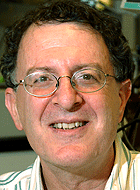Enola K. Proctor, Ph.D., a pioneer in the field of mental health services research and the social work profession, and Jeffrey I. Gordon, M.D., whose groundbreaking studies have revealed the contributions of gut microbes to human health and disease, will receive Washington University’s 2009 faculty achievement awards, Chancellor Mark S. Wrighton announced.

Proctor, the Frank J. Bruno Professor of Social Work Research and associate dean for research, is the recipient of the Arthur Holly Compton Faculty Achievement Award, and Gordon, the Dr. Robert J. Glaser Distinguished University Professor and director of the Center for Genome Sciences, is the recipient of the Carl and Gerty Cori Faculty Achievement Award.
They will receive their awards and give presentations of their scholarly work during a ceremony in December.
“Professors Proctor and Gordon are outstanding selections for this important honor,” Wrighton said. “Both have made extraordinary contributions through their research, and each has excelled as a leader in their field and at Washington Uni-versity. I am proud of their accomplishments and pleased to see their colleagues recognize them with these awards.”
Proctor is recognized for her work in advancing the implementation of evidence-based practices in social service settings.
For more than a decade, she has led the Brown School’s Center for Mental Health Services Research (CMHSR). Continually funded by the National Institute for Mental Health (NIMH) since its inception in 1993, CMHSR collaborates with its partners to build a base of evidence designed to address the challenges of delivering mental health services to vulnerable populations. The center is the only one of its kind that is part of a social work school.
Proctor’s scholarship has significantly advanced the field of mental health services research. She is a national leader in the scientific study of the movement of health practices from clinical knowledge to practical applications, and her distinguished career is reflected in the more than 100 books and articles that she has published or co-published over the years.
Nationally, Proctor was appointed by the U.S. Department of Health and Human Services to serve on the National Advisory Mental Health Council of NIMH — the only social work researcher to receive this prestigious appointment.
Among her numerous awards are recognitions by the National Association of Social Workers and the Alliance for Mentally Ill.
Proctor joined the Brown School faculty in 1977. She currently serves as associate dean for research, leading the development of the school’s research excellence through the careful mentoring and support of faculty, the creation of a strong research infrastructure and relentless work to connect the scholarship of faculty to external support.
A generous and committed teacher to both doctoral and master’s students, Proctor’s teaching focuses on research and evaluation methodology as well as social work in health and mental health-care settings. She also leads a pre- and postdoctoral training program, now in its 13th year with NIMH support.

Gordon is internationally recognized for establishing a link between obesity and the trillions of friendly microbes that live in the intestine.
He recently received a $5.5 million grant from the Bill & Melinda Gates Foundation to study whether those microbes may also contribute to severe malnutrition in infants who live in developing countries.
Additionally, Gordon’s research has helped launch a worldwide effort to use genomic and computational methods to characterize the microbes and microbial genes in the human body.
He earned a medical degree from the University of Chicago and completed his clinical training in internal medicine and gastroenterology at Barnes-Jewish Hospital and the School of Medicine and his research training at the National Institutes of Health.
Gordon joined the School of Medicine faculty in 1981. He served as head of the Department of Molecular Biology and Pharmacology from 1991-2004 before being named director of the newly created Center for Genome Sciences, part of the University’s BioMed21 initiative in translational medicine.
Throughout his career, Gordon has been an advocate for interdisciplinary science education. From 1994-2003, he was director of the University’s Division of Biology and Biomedical Sciences, which oversees all doctoral students in biomedical sciences.
As an avid supporter of the University’s educational mission, Gordon has mentored 100 doctoral, M.D./Ph.D. and post-doctoral students.
He is a member of the National Academy of Sciences, the American Academy of Arts and Sciences and the Institute of Medicine. A prolific scientist, Gordon has published 400 scientific papers and holds 23 U.S. patents.